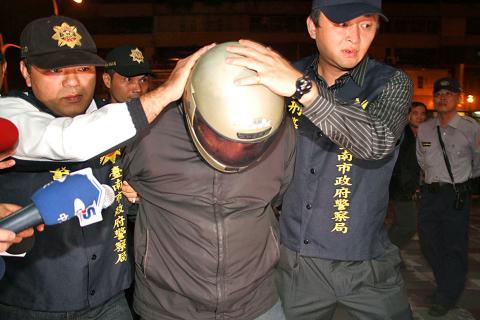The Supreme Court yesterday upheld a sentence of life imprisonment for convicted child killer Tseng Wen-chin (曾文欽), angering the victim’s family, who condemned the nation’s justice system for not issuing a death sentence for the murder.
Tseng, 32, was found guilty of slashing the throat of a 10-year-old boy, surnamed Fang (方), and leaving him to die in Tainan in 2012.
Tseng randomly chose his victim at an arcade in a Tainan department store.

Photo: CNA
Tseng further shocked the public with remarks he made after his arrest, saying: “In Taiwan, you will not be sentenced to death for killing just one or two people.”
Commentators said the case was a major test for the judiciary regarding the random murder of children, and that a number of suspects in subsequent murder cases had cited Tseng’s words that judges would not sentence them to death.
The Supreme Court said that Tseng was assessed to have been mentally ill and suffering from depression and anxiety at the time of the murder, so in accordance with Taiwan’s adoption of the International Covenant on Civil and Political Rights and the International Covenant on Economic, Social and Cultural Rights in 2009, the death sentence could not be applied.
“Tseng had no prior criminal record, he had only a grade-school education, had poor social skills and had been without a job for many months. Under the negative emotions of helplessness, anxiety and depression, Tseng committed a premeditated murder, but he was not beyond the bounds of rehabilitation,” the court statement said.
“[The murder] was due to problems he had while growing up and mental illness, and he confessed to the crime, therefore he was not devoid of human feelings and there remains the possibility of rehabilitation. Therefore, a death sentence is not suitable in this case, and the court sentenced him to life in prison,” it said.
Following yesterday’s ruling, which was final, the victim’s aunt reacted angrily.
“Is there any fairness left in our society? Taiwan’s justice system is dead,” she said. “I want to ask these judges: Where is your sense of justice? Where is your moral righteousness?”
Having attended the trial, she said Tseng was only acting to fool the judges into believing he was mentally ill.
“This is a disgraceful judgement. I cannot accept it at all,” she said. “The court says this killer does not deserve to die, but what about our little boy — did he deserve to die? Who can give justice to him?”
Taiwan Children’s Rights Association director-general Wang Wei-chun (王薇君) said the ruling did not conform with society’s expectations.
“We have seen many children being murdered since this case. How many more children will have their throats cut? The murderers seek out little children because they are easy to kill and cannot defend themselves,” Wang said.
“The judiciary wants to give second chances at life for the killers, but how can they prevent people from copying these crimes?” Wang asked. “I do not understand what has happened to our nation’s justice system. They keep coming up with these rulings that people feel are very far out of touch.”

Conflict with Taiwan could leave China with “massive economic disruption, catastrophic military losses, significant social unrest, and devastating sanctions,” a US think tank said in a report released on Monday. The German Marshall Fund released a report titled If China Attacks Taiwan: The Consequences for China of “Minor Conflict” and “Major War” Scenarios. The report details the “massive” economic, military, social and international costs to China in the event of a minor conflict or major war with Taiwan, estimating that the Chinese People’s Liberation Army (PLA) could sustain losses of more than half of its active-duty ground forces, including 100,000 troops. Understanding Chinese

The Ministry of Foreign Affairs (MOFA) yesterday said it is closely monitoring developments in Venezuela, and would continue to cooperate with democratic allies and work together for regional and global security, stability, and prosperity. The remarks came after the US on Saturday launched a series of airstrikes in Venezuela and kidnapped Venezuelan President Nicolas Maduro, who was later flown to New York along with his wife. The pair face US charges related to drug trafficking and alleged cooperation with gangs designated as terrorist organizations. Maduro has denied the allegations. The ministry said that it is closely monitoring the political and economic situation

UNRELENTING: China attempted cyberattacks on Taiwan’s critical infrastructure 2.63 million times per day last year, up from 1.23 million in 2023, the NSB said China’s cyberarmy has long engaged in cyberattacks against Taiwan’s critical infrastructure, employing diverse and evolving tactics, the National Security Bureau (NSB) said yesterday, adding that cyberattacks on critical energy infrastructure last year increased 10-fold compared with the previous year. The NSB yesterday released a report titled Analysis on China’s Cyber Threats to Taiwan’s Critical Infrastructure in 2025, outlining the number of cyberattacks, major tactics and hacker groups. Taiwan’s national intelligence community identified a large number of cybersecurity incidents last year, the bureau said in a statement. China’s cyberarmy last year launched an average of 2.63 million intrusion attempts per day targeting Taiwan’s critical

‘SLICING METHOD’: In the event of a blockade, the China Coast Guard would intercept Taiwanese ships while its navy would seek to deter foreign intervention China’s military drills around Taiwan this week signaled potential strategies to cut the nation off from energy supplies and foreign military assistance, a US think tank report said. The Chinese People’s Liberation Army (PLA) conducted what it called “Justice Mission 2025” exercises from Monday to Tuesday in five maritime zones and airspace around Taiwan, calling them a warning to “Taiwanese independence” forces. In a report released on Wednesday, the Institute for the Study of War said the exercises effectively simulated blocking shipping routes to major port cities, including Kaohsiung, Keelung and Hualien. Taiwan would be highly vulnerable under such a blockade, because it